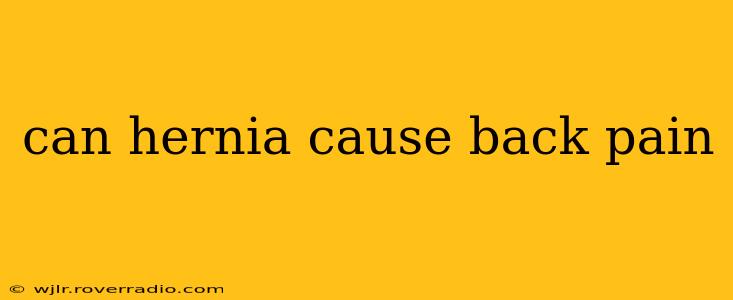Back pain is a common complaint, affecting millions worldwide. While many causes exist, from muscle strains to more serious conditions, one question frequently arises: can a hernia cause back pain? The answer is a nuanced yes, but understanding the specifics is crucial. This article explores the link between hernias and back pain, addressing common questions and providing clarity on this complex issue.
What is a Hernia?
Before delving into the connection with back pain, it's essential to understand what a hernia is. A hernia occurs when an organ or fatty tissue protrudes through a weakened area of muscle. This most commonly happens in the abdomen, but hernias can also occur in other parts of the body. The most common types include:
- Inguinal hernia: This affects the groin area.
- Femoral hernia: This also occurs in the groin, but slightly lower than an inguinal hernia.
- Hiatal hernia: This involves the stomach protruding through the diaphragm into the chest cavity.
- Incisional hernia: This develops at the site of a previous surgical incision.
- Umbilical hernia: This occurs around the navel.
- Spinal hernia (Disc Herniation): This involves the intervertebral disc bulging or rupturing, pressing on nearby nerves. This type is frequently associated with back pain.
While the first five types are typically associated with abdominal discomfort, it’s the spinal hernia (disc herniation) that most directly relates to back pain.
Can a Hiatal Hernia Cause Back Pain?
Yes, a hiatal hernia can indirectly contribute to back pain. While the hernia itself isn't directly causing the back pain, the associated gastroesophageal reflux disease (GERD) can lead to muscle spasms and referred pain in the upper back. The constant irritation and inflammation from acid reflux can trigger muscle tension and pain that radiates to the back.
Can Other Types of Hernias Cause Back Pain?
Generally, other types of hernias are less likely to cause direct back pain. The pain associated with inguinal, femoral, umbilical, and incisional hernias is typically localized to the area of the hernia itself – the groin, abdomen, or surgical site. However, severe cases could indirectly cause back pain due to muscle strain from guarding or compensatory movements.
How Does a Spinal Hernia (Disc Herniation) Cause Back Pain?
A spinal hernia, or disc herniation, is the most common type directly linked to back pain. The intervertebral discs act as cushions between the vertebrae in your spine. When a disc herniates, the soft inner material (nucleus pulposus) pushes out through a tear in the tougher outer layer (annulus fibrosus). This can put pressure on nearby nerves, causing pain, numbness, tingling, and weakness in the back, legs, or arms, depending on the location of the herniation. The pain can be sharp, shooting, or aching, and its intensity can vary greatly.
What are the Symptoms of a Hernia That Might Cause Back Pain?
The symptoms vary depending on the type of hernia. For spinal hernias, common symptoms include:
- Lower back pain: This is often the primary symptom.
- Sciatica: Pain radiating down the leg(s), often accompanied by numbness or tingling.
- Muscle weakness: In the legs or back.
- Numbness or tingling: In the legs or back.
- Difficulty with bowel or bladder control (in rare cases): This is a serious symptom requiring immediate medical attention.
For other types of hernias, symptoms are usually more localized to the hernia site itself and might not include back pain.
When Should I See a Doctor About Back Pain?
It’s crucial to seek medical attention if your back pain is severe, persistent, or accompanied by other symptoms like numbness, tingling, weakness, or bowel/bladder issues. A doctor can accurately diagnose the cause of your back pain and recommend appropriate treatment. Self-treating can be risky and delay proper care.
How is a Hernia Diagnosed?
Diagnosis typically involves a physical exam and imaging studies such as X-rays, CT scans, or MRIs. These tests help visualize the herniated disc or other hernias and determine the extent of the problem.
In conclusion, while various types of hernias exist, it's primarily spinal hernias (disc herniations) that directly cause back pain. Other hernias can indirectly contribute to back pain through associated conditions or compensatory muscle strain. If you're experiencing back pain, it's essential to consult a doctor for proper diagnosis and treatment. Remember, this information is for general knowledge and doesn't replace professional medical advice.
